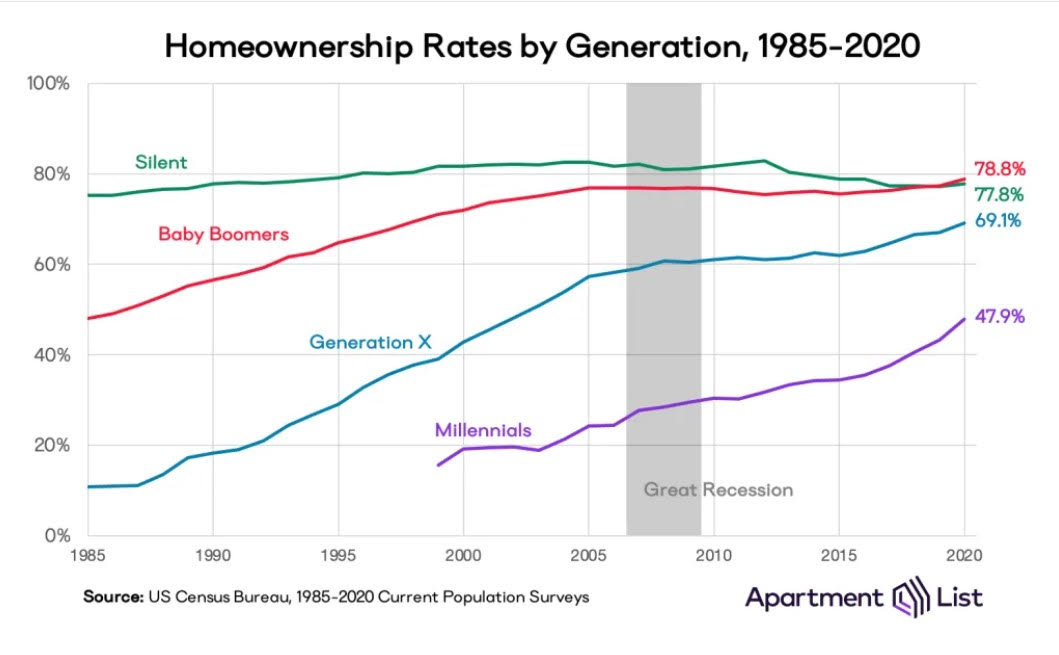My Two-for-Tuesday morning train WFH reads:
• The most unusual job market in modern American history, explained Quits, big raises and severe labor shortages: 10 charts on the completely surprising 2021 labor market (Washington Post)
• Money has never felt more fake. The market feels like a bubble. Does it matter? The concept of value is a fuzzy one, and valuation is often more art than it is science. Psychology has always played a role in money and investing — and there have always been bubbles, too, where the price of an asset takes off at a rapid pace and disconnects from the fundamental value. (Vox) but see Billionaires Are Embracing Crypto in Case Money ‘Goes to Hell’ Brokerage founder Thomas Peterffy says its prudent to have some crypto, while Ray Dalio views it as alternative to cash. (Wealth)
• Stock Market History, Illuminated US outperformance was either driven by something fundamental or economic (interest rates, free money, tech stock dominance, sales growth, improving ROICs, earnings upgrades, etc.), something less so (flows, narratives, memes, psychology, FOMO), or a combination of the two. It is also not impossible that US outperformance was driven by nothing (aka it just happened). Illuminated (Albert Bridge Capital)
• Car shortage could change buying behavior forever Car dealers’ annual year-end sell-a-thons have turned into wait-a-thons for many shoppers unable to find the vehicle they want on dealer lots — but that could be about to change as some companies modernize the way they sell their cars. (Axios) see also 7 Trends in Car Markets Buying, Used Cars, EVs, Enthusiasts, Auctions, Collectibles, Self-Driving are changing the auto market permanently (The Big Picture)
• Here’s (Almost) Everything Wall Street Expects in 2022 As 2022 begins, the overriding message from almost 50 financial institutions across Wall Street and beyond is that conditions still look good, but the rip-roaring rallies powered by the reopening are history. Growth will ease. Returns will moderate. Risks abound—but so do opportunities. (Bloomberg)
• The $2 Trillion Cryptocurrency Market Is Drawing Interest From Investors, Scrutiny From U.S. Regulators Here is what you need to know about new efforts to police a lucrative but murky sector (Wall Street Journal) see also This Was the Year When Finance Jumped the Doge From GameStop to bored apes, weirdness abounded among meme-loving amateur investors. (Wired)
• Why are Mozart, Beethoven, and Bach still regarded as the greatest composers? If Edison were born today, what would he invent? Where are we making progress? (Econlib)
• Politics Was Supposed to Return to Normal in 2021. What Happened? Neither party is strong enough to impose its will, while ideological polarization has made compromise nearly impossible (Wall Street Journal) see also Why The President’s Party Almost Always Has A Bad Midterm One of the most ironclad rules in American politics is that the president’s party loses ground in midterm elections. It’s worth digging into the data behind this rule, though, and the reasons why it so often holds true. (FiveThirtyEight)
• The pandemic’s true death toll How many people have died because of the covid-19 pandemic? Many people who die while infected with SARS-CoV-2 are never tested for it, and do not enter the official totals. Conversely, some people whose deaths have been attributed to covid-19 had other ailments that might have ended their lives on a similar timeframe anyway. (Economist)
• The Trouble With Airports, and How to Fix Them With all the aggravation associated with flying these days, airport designers are hoping to calm things down with outdoor spaces, wide-open views, less noise and even foliage. (New York Times)
Be sure to check out our Masters in Business next week with University of Michigan social psychology professor Richard Nisbett. He is Co-director of the Culture and Cognition program at Michigan, focusing on reasoning and basic cognitive processes. he is the author of numerous books, the most recent of which is “Thinking: A memoir.” Malcolm Gladwell has called him “The most influential thinker in my life.”


